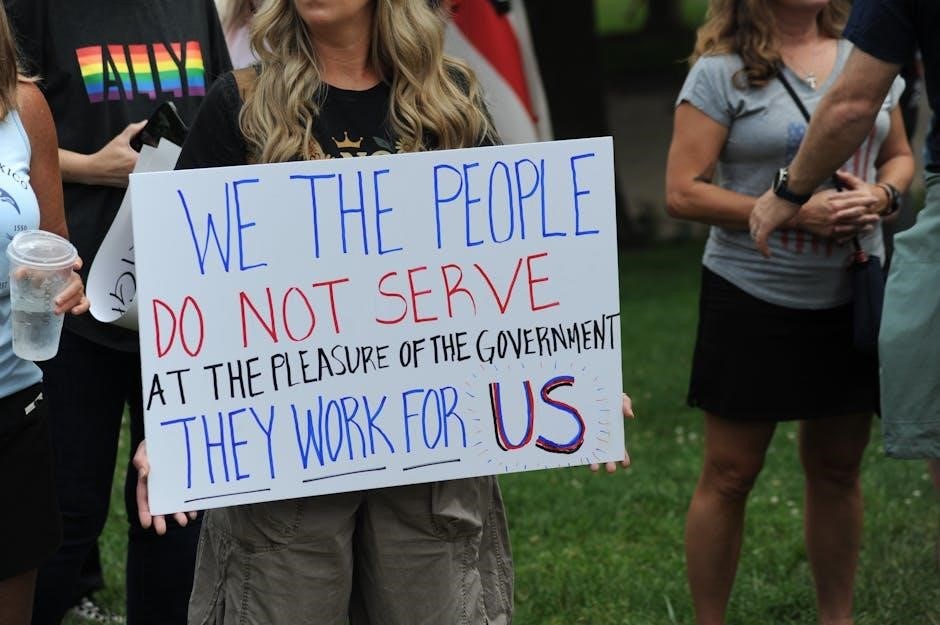crucial accountability pdf
Crucial Accountability PDF: A Comprehensive Guide
This PDF guide outlines essential tools for resolving violated expectations, broken commitments, and bad behavior, offering practical strategies to improve accountability in both personal and professional settings․

Overview of Crucial Accountability
Crucial Accountability provides a framework for addressing broken commitments, bad behavior, and unmet expectations, helping individuals and organizations improve relationships and foster accountability․
Key Concepts and Objectives
Crucial Accountability focuses on resolving violated expectations, broken commitments, and bad behavior through structured conversations․ Its key concepts include preparing for discussions, addressing issues effectively, and fostering accountability without damaging relationships․ The primary objective is to equip individuals with skills to hold others accountable while maintaining trust and respect․ By mastering these techniques, individuals can improve communication, address conflicts constructively, and enhance both personal and professional outcomes․ The approach emphasizes transparency, consistency, and fairness, ensuring that accountability leads to improved performance and stronger relationships․ These concepts are designed to empower individuals to navigate challenging situations with confidence and integrity․
Practical Applications in Personal and Professional Settings
Crucial Accountability provides practical strategies for addressing challenges in both personal and professional environments․ In personal relationships, it helps resolve conflicts and improve communication by focusing on mutual respect and clarity․ Professionally, it equips leaders and teams to address broken commitments, missed deadlines, and poor behavior, fostering a culture of accountability and trust․ The techniques outlined in the guide enable individuals to navigate difficult conversations effectively, ensuring expectations are met without damaging relationships․ By applying these tools, organizations can enhance performance, reduce stress, and build stronger, more collaborative teams․ These applications make Crucial Accountability a valuable resource for personal growth and professional success․

The Importance of Accountability
Accountability fosters trust, improves relationships, and enhances organizational performance by addressing broken commitments and poor behavior, ensuring expectations are met and results are delivered effectively․
Defining Accountability and Its Role in Relationships
Accountability is the practice of taking responsibility for one’s actions, decisions, and their impact on others․ It plays a vital role in building trust, respect, and strong relationships, both personally and professionally․ By holding oneself and others accountable, individuals demonstrate integrity, reliability, and a commitment to fairness․ In personal relationships, accountability fosters emotional safety and strengthens bonds, while in professional settings, it promotes a culture of responsibility and high performance․ Effective accountability involves acknowledging mistakes, learning from them, and making amends when necessary․ This mindset not only resolves conflicts but also enhances collaboration and mutual understanding, making it a cornerstone of healthy and productive relationships․
Why Accountability is Crucial in Organizations
Accountability is essential in organizations as it drives performance, trust, and sustainable success․ When individuals and teams are held accountable, they take ownership of their actions, decisions, and outcomes, fostering a culture of responsibility․ This leads to higher levels of engagement, collaboration, and innovation․ Accountability ensures that expectations are met, commitments are honored, and goals are achieved, which in turn enhances organizational credibility and stakeholder confidence․ Without accountability, organizations risk decreased morale, poor decision-making, and inefficiency․ By promoting accountability, leaders can address issues like missed deadlines, broken promises, and bad behavior, ultimately improving overall performance and creating a culture of integrity and results-driven outcomes․

Preparing for an Accountability Discussion
Effective preparation involves clarifying expectations, identifying specific issues, and planning strategies to address them constructively, ensuring a focused and results-oriented conversation․
Steps to Prepare for Difficult Conversations
Preparing for accountability discussions involves several key steps․ First, clarify the specific issue or expectation that was violated․ Gather relevant facts and evidence to support your position․ Next, identify the desired outcome of the conversation, ensuring it is clear and actionable․ Practice using the STATE technique: Start with the facts, Tell the story, Ask for the other person’s perspective, Talk tentatively, and End with a clear agreement․ Additionally, anticipate potential reactions and plan how to address them․ Finally, choose the right time and place for the discussion, ensuring both parties are ready to engage constructively․ Proper preparation ensures the conversation remains focused and productive․
Skills and Mindsets Required for Effective Communication
Effective communication in accountability discussions demands specific skills and mindsets․ Begin with a clear purpose, focusing on resolving issues rather than assigning blame․ Practice active listening to understand the other person’s perspective and acknowledge their emotions․ Maintain a calm and empathetic tone to foster trust․ Use the STATE method: Start with facts, Tell your story, Ask for their view, Talk tentatively, and End with a clear agreement․ Cultivate a growth mindset, viewing the conversation as an opportunity for improvement rather than confrontation․ Stay focused on the issue at hand and avoid distractions․ These skills ensure accountability discussions are productive and lead to positive outcomes․

Conducting the Accountability Discussion
Mastering techniques to address violated expectations and poor behavior is key․ Stay calm, focus on facts, and ensure a fair dialogue to achieve resolution and clear agreements․
Techniques for Resolving Violated Expectations
Effective techniques involve addressing issues calmly and focusing on facts rather than emotions․ The STATE method—Start with the facts, Tell your story, Ask for others’ perspective, and Talk tentatively—is a proven approach․ Begin conversations with a clear purpose, ensuring both parties feel heard․ Focus on specific behaviors rather than general attacks to avoid defensiveness․ Use “I” statements to express concerns without blame․ Additionally, create a safe space for dialogue by setting aside emotions and staying solution-oriented․ These strategies help resolve conflicts constructively, fostering accountability while maintaining trust and respect in relationships․ Regular practice of these techniques enhances communication skills and promotes positive outcomes in both personal and professional settings․

Common Challenges and How to Overcome Them
Common challenges in accountability discussions include defensiveness, emotional reactions, and unclear expectations․ To overcome these, focus on facts rather than assumptions, and use “I” statements to express concerns․ Practice active listening to understand the other person’s perspective and remain calm․ Address issues promptly to prevent resentment from building․ Additionally, clarify expectations upfront to avoid misunderstandings․ Training in crucial conversations and seeking feedback can enhance these skills․ By addressing challenges proactively and maintaining a solution-oriented mindset, individuals can foster accountability while preserving trust and respect in their relationships․ Regular practice and reflection further improve the effectiveness of these strategies in both personal and professional contexts․

Following Up After the Discussion
Following up ensures accountability, tracks progress, and maintains trust․ Schedule regular check-ins and consistently monitor commitments to reinforce responsible behavior and foster a culture of accountability․
How to Ensure Commitments Are Met
Ensuring commitments are met requires consistent follow-up and clear communication․ Schedule regular check-ins to track progress and provide feedback, fostering accountability and trust․ Document agreements and action plans to maintain clarity and ensure alignment․ Address obstacles promptly and collaboratively to prevent setbacks․ Celebrate successes to reinforce positive behavior and motivate continued effort․ By maintaining open lines of communication and holding individuals accountable, you create a culture of reliability and integrity․ This approach not only strengthens relationships but also drives results, ensuring that commitments are fulfilled effectively․
Measuring the Effectiveness of Accountability Conversations
Evaluating the success of accountability discussions involves tracking outcomes and assessing behavior changes․ Use specific metrics to measure progress, such as whether commitments are met or improvements are observed․ Gather feedback from all parties to understand their perceptions of the conversation’s impact․ Documenting follow-up actions and results helps determine if goals were achieved․ Over time, observe consistent behavior changes to gauge long-term effectiveness․ Regular reflection and adjustment ensure accountability practices remain impactful․ By focusing on measurable results, you can refine your approach and foster a culture of accountability and continuous improvement․

Case Studies and Real-World Examples
Explore real-world scenarios where Crucial Accountability techniques successfully resolved conflicts, improved relationships, and enhanced organizational performance through practical application of its proven strategies․
Success Stories of Implementing Crucial Accountability
Organizations and individuals have achieved remarkable results by applying Crucial Accountability techniques․ For instance, a global company reduced employee turnover by addressing broken commitments through open dialogue․ A school district improved student performance by holding teachers and staff accountable for measurable goals․ The STATE method—Start with Heart, Tell the Story, Ask for Help, Talk Tentatively, and Encourage Testing—has been instrumental in resolving conflicts and fostering trust․ These success stories highlight how accountability conversations can lead to lasting positive change and improved outcomes in both professional and personal settings, as demonstrated in the Crucial Accountability PDF guide․
Lessons Learned from Failed Accountability Efforts
Failed accountability efforts often stem from poor preparation, emotional approaches, or lack of clarity in expectations․ One common mistake is avoiding difficult conversations, which allows issues to escalate․ Another pitfall is focusing on blame rather than solutions, leading to defensiveness․ Additionally, failing to document commitments or establish clear consequences can undermine accountability․ Organizations have also learned that without consistent follow-up, even well-intentioned discussions may not lead to lasting change․ These lessons highlight the importance of using structured approaches, such as the STATE method, to navigate accountability conversations effectively, as emphasized in the Crucial Accountability PDF guide․

Additional Resources and Tools
Explore recommended readings, online courses, and workshops for mastering accountability skills․ Downloadable guides and training programs are also available to enhance your learning experience․
Recommended Reading and Training Programs
Enhance your understanding of accountability with resources like Crucial Accountability by Kerry Patterson, Joseph Grenny, Ron McMillan, and Al Switzler․ This book provides practical tools for addressing violated expectations and improving relationships․ Additionally, explore training programs such as Crucial Conversations and Crucial Influence, which focus on mastering high-stakes dialogue and influencing behaviors․ Online courses and workshops are also available, offering skill development in accountability and performance discussions․ These resources are designed to help individuals and organizations build stronger relationships and achieve better outcomes through effective communication and accountability practices․
Online Courses and Workshops for Skill Development
Online courses and workshops on Crucial Accountability offer practical training to master accountability skills․ These programs, such as Crucial Conversations and Crucial Influence, teach how to navigate high-stakes discussions and influence behaviors effectively․ Participants learn techniques like the STATE method to address violated expectations and improve relationships․ Workshops often include interactive exercises, real-world case studies, and expert guidance to ensure skill development․ Many programs are available online, making them accessible for both individuals and organizations․ These resources are designed to enhance communication, resolve conflicts, and foster accountability in personal and professional settings, leading to improved performance and stronger relationships․ They provide a structured path to becoming proficient in holding others accountable while maintaining trust and respect․